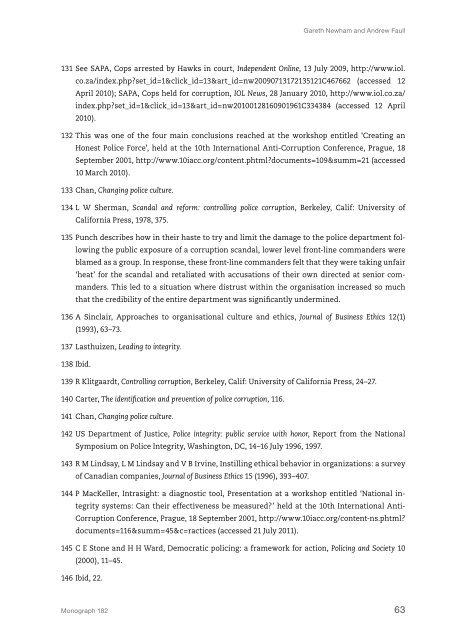Protector or predator? - Institute for Security Studies
Protector or predator? - Institute for Security Studies
Protector or predator? - Institute for Security Studies
You also want an ePaper? Increase the reach of your titles
YUMPU automatically turns print PDFs into web optimized ePapers that Google loves.
Gareth Newham and Andrew Faull<br />
131 See SAPA, Cops arrested by Hawks in court, Independent Online, 13 July 2009, http://www.iol.<br />
co.za/index.php?set_id=1&click_id=13&art_id=nw20090713172135121C467662 (accessed 12<br />
April 2010); SAPA, Cops held f<strong>or</strong> c<strong>or</strong>ruption, IOL News, 28 January 2010, http://www.iol.co.za/<br />
index.php?set_id=1&click_id=13&art_id=nw20100128160901961C334384 (accessed 12 April<br />
2010).<br />
132 This was one of the four main conclusions reached at the w<strong>or</strong>kshop entitled ‘Creating an<br />
Honest Police F<strong>or</strong>ce’, held at the 10th International Anti-C<strong>or</strong>ruption Conference, Prague, 18<br />
September 2001, http://www.10iacc.<strong>or</strong>g/content.phtml?documents=109&summ=21 (accessed<br />
10 March 2010).<br />
133 Chan, Changing police culture.<br />
134 L W Sherman, Scandal and ref<strong>or</strong>m: controlling police c<strong>or</strong>ruption, Berkeley, Calif: University of<br />
Calif<strong>or</strong>nia Press, 1978, 375.<br />
135 Punch describes how in their haste to try and limit the damage to the police department following<br />
the public exposure of a c<strong>or</strong>ruption scandal, lower level front-line commanders were<br />
blamed as a group. In response, these front-line commanders felt that they were taking unfair<br />
‘heat’ f<strong>or</strong> the scandal and retaliated with accusations of their own directed at seni<strong>or</strong> commanders.<br />
This led to a situation where distrust within the <strong>or</strong>ganisation increased so much<br />
that the credibility of the entire department was significantly undermined.<br />
136 A Sinclair, Approaches to <strong>or</strong>ganisational culture and ethics, Journal of Business Ethics 12(1)<br />
(1993), 63–73.<br />
137 Lasthuizen, Leading to integrity.<br />
138 Ibid.<br />
139 R Klitgaardt, Controlling c<strong>or</strong>ruption, Berkeley, Calif: University of Calif<strong>or</strong>nia Press, 24–27.<br />
140 Carter, The identification and prevention of police c<strong>or</strong>ruption, 116.<br />
141 Chan, Changing police culture.<br />
142 US Department of Justice, Police integrity: public service with hon<strong>or</strong>, Rep<strong>or</strong>t from the National<br />
Symposium on Police Integrity, Washington, DC, 14–16 July 1996, 1997.<br />
143 R M Lindsay, L M Lindsay and V B Irvine, Instilling ethical behavi<strong>or</strong> in <strong>or</strong>ganizations: a survey<br />
of Canadian companies, Journal of Business Ethics 15 (1996), 393–407.<br />
144 P MacKeller, Intrasight: a diagnostic tool, Presentation at a w<strong>or</strong>kshop entitled ‘National integrity<br />
systems: Can their effectiveness be measured?’ held at the 10th International Anti-<br />
C<strong>or</strong>ruption Conference, Prague, 18 September 2001, http://www.10iacc.<strong>or</strong>g/content-ns.phtml?<br />
documents=116&summ=45&c=ractices (accessed 21 July 2011).<br />
145 C E Stone and H H Ward, Democratic policing: a framew<strong>or</strong>k f<strong>or</strong> action, Policing and Society 10<br />
(2000), 11–45.<br />
146 Ibid, 22.<br />
Monograph 182 63

















